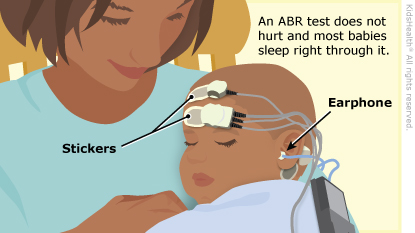All babies get a hearing test when they're born. It's called a newborn hearing screening.
Your baby didn't pass the newborn hearing screening. This can happen in a baby with normal hearing if they move a lot during the test or if there is material in the ear canal left over from the birth. Your baby needs a more detailed hearing test called an auditory brainstem response (ABR) test to check their hearing again.
It's important to find and treat hearing problems early in babies because hearing is very important for their development. Follow these instructions to get your baby ready for the ABR test.



How does the ABR test work? The ABR test checks how messages from the ears are getting to the brain. During the test, the audiologist (hearing specialist) will give your baby headphones or small earphones that fit in your baby's ears. The audiologist also will put little stickers on your baby's head. These stickers are sensors that measure how well the sound messages are getting to the brain.
How long does an ABR test take? Plan to spend about 3 hours at the appointment for the ABR test. The test itself takes about 1½ hours. You can stay with your baby during the test. You can bring a family member or a trusted friend to help you.
How do I get the results of the ABR test? When the test is complete, the audiologist will tell you the results and let you know if your baby needs other testing or more care. If needed, you will follow up with a health care provider who specializes in hearing.